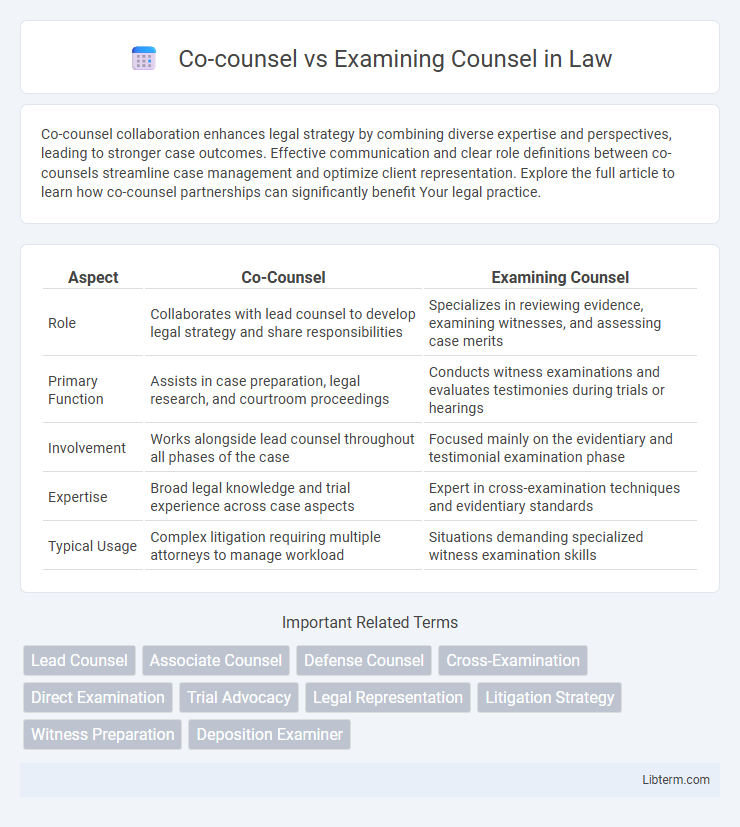Co-counsel collaboration enhances legal strategy by combining diverse expertise and perspectives, leading to stronger case outcomes. Effective communication and clear role definitions between co-counsels streamline case management and optimize client representation. Explore the full article to learn how co-counsel partnerships can significantly benefit Your legal practice.
Table of Comparison
| Aspect | Co-Counsel | Examining Counsel |
|---|---|---|
| Role | Collaborates with lead counsel to develop legal strategy and share responsibilities | Specializes in reviewing evidence, examining witnesses, and assessing case merits |
| Primary Function | Assists in case preparation, legal research, and courtroom proceedings | Conducts witness examinations and evaluates testimonies during trials or hearings |
| Involvement | Works alongside lead counsel throughout all phases of the case | Focused mainly on the evidentiary and testimonial examination phase |
| Expertise | Broad legal knowledge and trial experience across case aspects | Expert in cross-examination techniques and evidentiary standards |
| Typical Usage | Complex litigation requiring multiple attorneys to manage workload | Situations demanding specialized witness examination skills |
Definition of Co-Counsel
Co-counsel refers to one or more attorneys who collaborate with the primary counsel to provide legal representation, sharing responsibilities such as case strategy, filing documents, and courtroom advocacy. Unlike examining counsel, whose role primarily involves questioning witnesses to assess credibility and gather information during trials or depositions, co-counsel actively participates in all aspects of a case's preparation and litigation. This collaborative approach allows for diverse legal expertise and improved case management in complex legal matters.
Definition of Examining Counsel
Examining Counsel refers to the attorney who presents a case during a deposition or court proceeding, responsible for questioning witnesses and gathering testimony to support their party's position. Unlike Co-counsel, who collaborate and assist each other in strategizing and trial preparation, Examining Counsel has the specific role of conducting examinations and controlling the flow of information during legal proceedings. Their skill in formulating precise, relevant questions is critical in building a strong case record and influencing outcomes.
Key Responsibilities of Co-Counsel
Co-counsel primarily shares equal responsibility in managing and advancing a legal case, including strategizing, conducting discovery, and filing motions, to ensure comprehensive representation. They collaborate closely with lead counsel to develop arguments, prepare witnesses, and coordinate trial tasks, often dividing complex case aspects to maximize efficiency and expertise. Their proactive involvement in legal research and client communication significantly contributes to shaping case outcomes and maintaining consistent advocacy.
Primary Duties of Examining Counsel
Examining Counsel is primarily responsible for assessing patent applications during prosecution, conducting prior art searches, and determining patentability based on legal standards. Their role involves reviewing claims, issuing office actions, and guiding applicants through the examination process to ensure compliance with patent laws. Co-counsel may assist but Examining Counsel holds the authority to grant or reject patents.
Collaboration Between Co-Counsel and Examining Counsel
Collaboration between Co-Counsel and Examining Counsel enhances patent prosecution efficiency by combining expertise in claim drafting and prior art evaluation. Co-Counsel provides strategic guidance and technical analysis, while Examining Counsel ensures thorough examination and compliance with patent office requirements. Their coordinated efforts streamline communication, reduce prosecution timelines, and improve patent quality.
Legal Settings Where Each Role Applies
Co-counsel typically collaborates with lead attorneys in complex litigation, transactional matters, or appeals to provide specialized expertise or share workload, commonly seen in corporate law, intellectual property cases, and class actions. Examining counsel plays a crucial role during the patent prosecution process before patent offices, conducting prior art searches, preparing patent applications, and responding to examiner rejections. Legal settings for co-counsel span across litigation and arbitration, whereas examining counsel functions primarily in patent law and regulatory compliance.
Skills Required for Co-Counsel vs Examining Counsel
Co-counsel requires strong collaborative skills, in-depth knowledge of case strategy, and the ability to support lead counsel effectively through legal research and drafting pleadings. Examining counsel must exhibit exceptional analytical skills, expertise in technical subject matter, and proficiency in conducting thorough claim examinations and patentability assessments. Both roles demand excellent communication skills, but co-counsel emphasize teamwork dynamics while examining counsel focus on objective, detail-oriented patent analysis.
Impact on Case Strategy and Outcome
Co-counsel and examining counsel play distinct roles that significantly influence case strategy and outcomes, with co-counsel providing collaborative support and specialized expertise to strengthen the overall legal approach. Examining counsel primarily focuses on in-depth analysis and interrogation during depositions or trials, shaping the presentation of evidence and witness credibility. Strategic coordination between co-counsel and examining counsel enhances case preparation, ensures comprehensive argumentation, and can decisively affect verdicts or settlements.
Ethical Considerations for Both Roles
Co-counsel and examining counsel must adhere to strict ethical considerations including confidentiality, conflict of interest, and professional responsibility to the client and court. Co-counsel share joint responsibility for case strategy and must ensure transparent communication, avoiding duplication or contradictory arguments. Examining counsel, often tasked with scrutinizing evidence or testimony, must maintain impartiality and fairness, upholding ethical standards to prevent bias or undue influence during examination.
Choosing the Right Counsel for Your Case
Choosing the right counsel for your case hinges on understanding the distinct roles of co-counsel and examining counsel. Co-counsel collaborates closely with lead attorneys, sharing responsibilities to enhance case strategy and courtroom effectiveness, while examining counsel specializes in detailed witness examination and evidence scrutiny during trials. Selecting between co-counsel and examining counsel depends on your case needs, complexity, and the desired expertise to strengthen courtroom advocacy and legal outcomes.
Co-counsel Infographic

 libterm.com
libterm.com